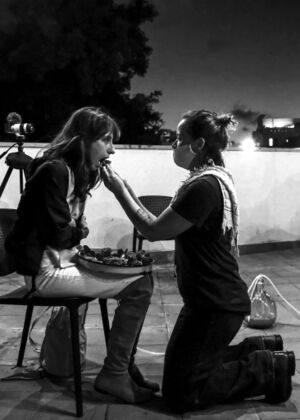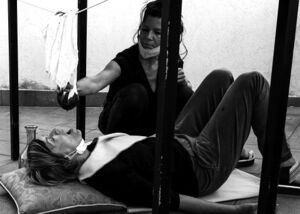Feeding
feeding
Feeding and eating is something one can do for oneself, but it is not an action that is possible without co-relations and interactions with others (animals, plants, the land, and so on). Today, after almost two years of a global pandemic, social distancing has forced people to stay apart and encouraged them not to exchange physical particles. I propose that feeding as a performative tactic of critical making might teach us something about how to nourish each other again.
In my artistic practice I use feeding and eating as performative research. I construct participatory meals as a critical reflection on and digestion of processes of socio-political constructions and individual choices. tactics[1] are time-based opportunities that we can seize to change or influence the mechanism we are a part of. As such, tactics do not overturn the ruling system, but use opportunities to strike at specific junctures.[2] Through the ongoing series of performances entitled To Serve You, I propose a critical performative tactic that explores the power relations between feeder and eater. It is an intimate performance series which explores elements of feeding and the power relations established in feeding through passion, pleasure,
and compassion alongside organization, supervision, and imposing.
To Serve You practices and examines feeding and the interrelationship it creates between feeders, eaters, and food. The performances engage all five senses—seeing, hearing, tasting, smelling, and touching—and the digestion and olfactory systems of the participants. Feeding as a performative tactic activates participants and viewers directly and physically, through the body. To Serve You addresses exterior as well as interior parts of the body, penetrating one’s physical experience in an attempt to raise a socio-political resistance from within. Philosopher Maurice Merleau-Ponty argues that ‘The perceiving subject is not this absolute thinker; rather, it functions according to a natal pact between our body and the world, between ourselves and our body.’[3] The performance series
To Serve You enters every gateway into one’s body to activate socio-political critical thinking.
Feeding as a performative tactic arouses direct and intimate inter-relations between feeder and eater, and between the members of a group of eaters. In agreeing to eat something, the eater accepts something foreign to become part of his/her body. ‘The classification of something as food means it is understood as something made to become part of who we are.’[4] According to philosopher Deane Curtin, humans have a physical understanding that anything they eat will become part of their bodily self. As such, according to Curtin, food holds a special relation to the Self. In the performance series To Serve You I, as the main feeder, draw attention to this physical understanding, while participants are challenged to respond and to interact with what might be transferred into their body and become part of them.
Feeding inherently contains power relations between the one who feeds and the one who eats.
The power relations can be found within personal relationships, as well as between humans and institutions, and people amid their socio-political community. Surprisingly these power relations are neither clear nor stable and tend to change throughout various feeding interactions. To Serve You seeks to explore the connection between food, rules, law, nationality, and security through the power relations between guest/host, feeder/eater and among the diners.
In a century in which everyday life is flooded with images, moving images and sounds, I choose to infiltrate all of the bodily senses, so that my practice can be experienced through the body as well as inside the body. To me this is especially urgent, since the local socio-political conflicts of the area east to the Mediterranean, where I live, are vigorously interpreted, visually and vocally. Between news, TV-shows, films, blogs, and academic research in various fields, endless information has been and is being communicated, documented, and recorded regarding the conflicts in this area. I experiment with senses and inner parts in order to explore the possibilities of embodying socio-political critical thinking and making. These experiences are a result of both dissatisfaction with communicating only through sight and sound, and of my eagerness to subversively interact and affect participants through my practice.
to serve you—a performance series
(2017–ongoing)
The first realization of the performance series was part of the exhibition ‘Motions for the Agenda’ (curated by Avi Feldman in collaboration with Vardit Gross, Artport 2017). First as a series of dinners with jurists, culture scholars, sociologists, and psychologists in which we talked about feeding while being fed by me, held at The Israeli Center for Digital Art in Holon. These dinners were recorded, then edited and mixed into a sound work. The next step, inspired by the sound work, was an intimate dinner performance of
a seven-course vegetarian meal performed by three feeders to an audience of six eaters.
Since then, To Serve You performs in different venues, it continuously adjusts itself to the changing socio-political and environmental surroundings alongside the performance location and the number
of eaters and feeders.
Performers: Michal Samama, Carmel Bar, Ofri Omer, Shailoh Phillips, Thalia Hoffman.
- ↑ I use the term tactic following Michel de Certeau’s use of the term in practices of everyday life.
- ↑ Michel de Certeau, Fredric Jameson and Carl R. Lovitt, ‘On the Oppositional Practices of Everyday Life’, Social Text 3 (Autumn 1980), pp. 3–43.
- ↑ Maurice Merleau-Ponty, ‘An Unpublished Text by Maurice Merleau-Ponty: A Prospectus of His Work’,
in The Primacy of Perception and Other Essays on Phenomenological Psychology, the Philosophy of Art, History, and Politics, ed. J.M. Edie, trans. A.B. Dallery (Evanston, IL: Northwestern University Press, 1964),
p. 5. - ↑ Deane W. Curtin, ‘Food/Body/Person’, in Cooking, Eating, Thinking: Transformative Philosophies of Food, ed. Deane W. Curtin and Lisa M. Heldke (Bloomington: Indiana University Press, 1992), pp. 3–22, p. 9.


